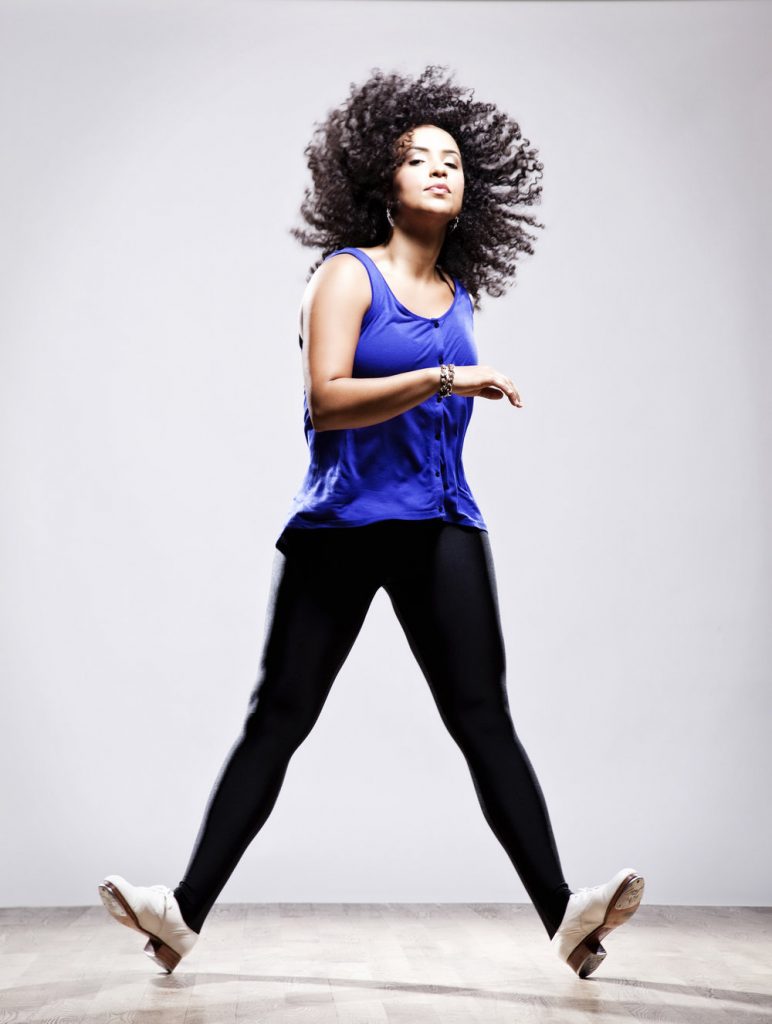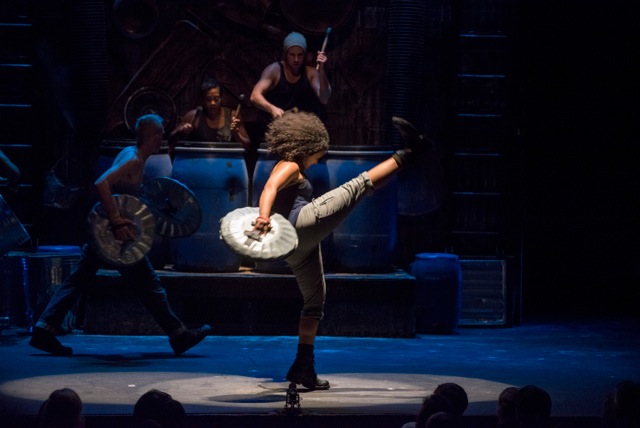Lisa LaTouche began tap at age eight after her mother showed her a little time step. Her career has taken off since. She’s studied under Buster Brown, Gregory Hines, and Savion Glover and performed on Broadway, including at the 70th Tony Awards. We talked about all angles of tap: emotional connection, its cultural roots in slavery and the African-American community, and finished off with a few tips for current students and adults eying that beginner adult tap class.
The interview below is edited for clarity and brevity—we could’ve talked for hours, but she had her rehearsal schedule and I my writing schedule. Enjoy!
Tap and Its Historical Roots
Lori: I did CDTA syllabus for dance and in tap we had to learn a bit about the history of tap and we would memorize things like, “The shim sham shimmy comes from black slavery and was danced and the end of a long workday.” We learned it but at the same time I had absolutely no emotional connection to it. Can you explain your connection with tap?
Lisa: My dad is actually from Trinidad and I grew up in Alberta, primarily Calgary and Edmonton. So, I learned a little bit about Caribbean history. I always had this understanding what a “minority” is. But I had lunch with people from all ethnicities all the time. I didn’t really think about it too much, but I always had an awareness.
Lori: You eventually moved to the US. What did you experience there?
Lisa: I get to the States, boom, it’s in your face. I worked with Mad Rhythms in Chicago. I learned a lot about black versus black discrimination within the black community. We would do school shows, and that was the only time in my life that I finally saw what they meant by an all-black school or all-Latino school or a white school based on the different areas. So it was a great eye-opener to America. And then I ended up following more pursuits and in New York and it’s just like no matter how far you get, you keep digging into the root of this.
Lori: So how does tap fit into this for you?
Lisa: Very much as an African-American folk dance. So here I am someone of color that isn’t particularly African-American, digging in and eventually at some point representing an African-American art form. So, I am very much emotionally connected to it. I think what’s important to talk about now is to make sure that we’re celebrating the heroes. So I feel like tap dance is such a hero through such grotesque times.
Fool’s Gold World Première at Fall for Dance North
Lori: Tell me about your piece for Fall for Dance North, Fool’s Gold, which has its world première on October 3rd. Why that name?
Lisa: I was standing in the Canadian Rockies, taking a break this summer, really obsessing over Pyramid Mountain in Jasper Park [Alberta, Canada], that had fool’s gold. It stood such tests of time. Glaciers could not in the ice age slice this rock because the elements that were formed were so sturdy. And that spoke to me because that’s the way tap dance is. It’s stood the test of so much time and it came through such oppression. Society, etc., has tried to yes, whitewash, yes, colonize, yes, put it as footnotes. It’s tried to undermine it so many times and the public can’t get enough of it. Whenever someone sees tap dance, it’s always celebrated. It’s just always celebrated. You put it up next to a gorgeous ballet. You’re going to revere the ballet, but the crowd goes wild when you see tap dance done well. It’s exciting because it’s progressive. So at the end of the day, they’re still knocking on our door. People still want tap dance.
Tap as a Hero, Tap and Its Heroes
Lori: A bonus is that you don’t have to bend in half backwards to be able to do it well.
Lisa: What’s interesting is the flexibility thing. I think of the Nicholas brothers and others. I think of all these women in these chorus lines, like Jeni LeGon, I think of Juanita Pitts. The list goes on and on and on. We don’t have to do that anymore, but they did.
Lori: I hadn’t thought of it that way.
Lisa: There’s a great documentary called Plenty of Good Women Dancers. And they tell these stories like you come and you audition for these producers and it was slave driving. They would say, “Can you do the splits? Can you do a back flip?” You had to do all of that just to get the gig. And then you still have to enter in the back room. And women had to have secret codes amongst each other to make sure that the brothers weren’t messing with them.
Lori: I had no idea. So, what kind of an impression did that leave on you?
Lisa: The women are so heroic. They would do a Caribbean show one day. They’d have to be en pointe the next day. They’d have to do all acrobatics. They had to do everything. And usually it was the male acts that got to do just a little act and hit it and quit it. But at the same time, I’m reading this grotesque book called Ring Shout Wheel About, and it talks about from the moment that they were put on these slave ships, the slave masters would whip them into dancing just to keep them strong. They’re still a herd of cattle at the end of the day. It wasn’t like, “Oh, let’s sit, let’s give you a break.” They were whipped into submission.
Lori: Did that change once slavery was abolished?
Lisa: Lincoln abolished slavery, but the South didn’t really let the slaves know until the very last moment that they could. So that’s why Juneteenth is celebrated because that’s the day that finally every black person realized they did not have to work for free. After that, they are taken away their rights. So, in order to make a buck, you had to do whatever you had to do. So a lot of times the dancing again was for survival.
Lori: I didn’t know that either.
Lisa: So now, you’re starting to make a couple of bucks. You have to have an act, you have to have a novelty. You have to be able to do the back flips and the splits. You have to do that in order to get the gig. Do you know what I mean? All these heroes did all that they could so that we can still enjoy tap dance. It’s supremely magical and it’s supremely…we’re survivors.
Lori: See, and that’s the part that wasn’t in the history lesson for me.
Lisa: No, but why would it be right? And I don’t think it’s anyone’s fault. It’s just is what happens. Things get brushed under the rug. And now with all the civil unrest, again, it’s finally an appropriate time and we can talk about it.
Slavery, Race, and Reverence
Lori: So there’s all this history, what would you want Canadian students of tap today to, to know about the history of tap?
Lisa: I would really want Canadians to understand that we’re not spared. We’re not as belligerent [as in the US], but we’re not spared. The hashtag for a while was “white silence is violence.” Just silence in general is violence. It doesn’t mean, okay, everybody gets BLM on their window. It just means: Can you please make sure you’re just checking on your neighbors? The feeling that I have here and some of the arguments I’ve gotten into with some people here is that sometimes it’s even been within family. It’s that that doesn’t exist here. “Lisa, you’re too emotional.” And I’m like, “Stop it. I’ve seen pictures in the paper of KKK written on somebody’s driveway, in the Northeast here in Calgary.” We still have assholes in humanity. You can’t avoid it. Just be a good person. That’s what it starts with. Do your history. I don’t need everybody to pass the Afro experience quiz, but I just want everybody to be nice to everybody.
Lori: I understand.
Lisa: And now even more in a pandemic, it has me thinking a lot. This is kind of an industry for the privileged. It’s so expensive. So how do I get this information and this art back to its people and make it accessible to everyone, not just to those who can afford the expensive classes and the costumes and trips and all that stuff? It’s more than that. So I want everybody to continue to have reverence, continue to enjoy it, continue to share it, continue to study it and also pass it on. How can we get this into community centers, not just like private dance studio?
Lori: Just a few weeks ago, I was caving under pressure so I threw a tap board down the floor that my husband made for me, turned on some music and banged it out for 20 minutes. I wish more people had that outlet.
Lisa: This is a good time to have these conversations. It’s not that we’ve thought about pointing out what everyone’s been doing wrong or right. It’s like, how can we continue to uplift things now? The worst thing that you can do is to turn your cheek and pretend that someone you know isn’t affected by anything happening in the world. I mean, that’s the beauty: the pandemic affects every person in the entire globe. And now this civil unrest and Black Lives Matter. I mean, it’s a topic that no one could not know about.

Connecting Your Emotions to Tap
Lori: How can students of tap put their emotions into the technique?
Lisa: Well, I think it goes back to what we originally were talking at the beginning about being emotionally connected to the craft. So I think the more that you do understand some of the backstories, or you find a tap dancer that you study that resonates with you—it’s going to be different for everyone—and then you have an emotional connection and a respect for the craft. When you are connected to your experience, you realize that you have this gift of dancing to let it out.
Lori: I see. That makes sense.
Lisa: It’ll draw you to a piece of music, of choreography, to a movie. It will draw you to something. And you have an outlet. And I don’t think you really realize it until you’re going through something. Like you were saying, you felt the walls were closing in a few weeks ago. And you didn’t realize how much throwing on those pair of shoes really just helped you.
Lori: They did. And I’ve been out of practice for years, so my technique isn’t anything really advanced.
Lisa: Whatever level of technique you have will show up on its own. It’s like learning your ABCs and eventually you don’t think about your ABCs. You’re just reading and writing.
Lori: Right.
Lisa: Continue to do your pliés. Continue to work on your shuffles. Continue to work on your time steps. Then figure out what it is that you’re feeling and connect to something. Then use your dancing.
Pulling Back from Competition
Lori: That’s exactly how it works, now that you describe it. I’d like to talk about competition. You said you’re pulling back from it.
Lisa: My question, to be honest with you, and I don’t have the answer, is what in humanity fueled the idea to pit people against each other? It’s different when you’re running and there’s a clock. But I’m reading all this stuff, what they were doing on the slave ships. We know stories of people beating each other to death. It’s gross. Why is it celebratory to make sure that you win and you cut this person? I’m not with it anymore. There’s healthy competition. There’s still getting inspiration from another great artist that performs greatly. But I just fricking hate the gold medal for something that is so raw.
Lori: I hadn’t thought of it that way before.
Lisa: I hate it now. There’s all these discussions. “Well, it does so much for someone’s confidence, dah dah dah.” It only does if you win. I think about it as now a mom, right? If he’s interested in whatever it is, I would want him to work with anybody he can learn from the most. And I personally am like, as a tap dancer, if he were to follow in my footsteps or whatever, I don’t think I’d go that route for him.
Lori: Really?
Lisa: I definitely would not. I don’t like the cattiness of the parents. I don’t like the ignorance of the judges, especially when it comes to tap. Because a lot of them don’t know what they’re talking about. It doesn’t feel good. So you leave frustrated. I don’t think it builds the confidence. That’s my opinion.
Lori: What would you rather see?
Lisa: I want them to feel what it’s like to be applauded for sure. And validated for sure. And to be able to step on stage and be vulnerable. Absolutely. And be uplifted and have the audience say thank you. And I think that’s enough.
Lori: I see.
Lisa: I just worked on this other Broadway-level project at the end of last year. This one dancer, who was the first place winner in So You Think You Can Dance in the US, wonderful person, beautiful person, very accomplished. But she was just like anybody else first moving to New York: She still had to figure out how she was going to find the right apartment and live where she’s got to live. She still had to figure out the right connections. Of course, she has an agent, etc., etc. But she had to learn a whole other way of moving. She has to pay her dues just like anybody else. Which is art. It’s different than when you are saying, “Okay, well, we got certain amount of balls in the hoop.” You crossed the net. There was a goal. The end. You won.
Lori: And you could have 100 people watching that, and coming to the same conclusion.
Lisa: Exactly.
Lori: Last question: Do you have a quick tip for adults who are thinking about starting tap lessons, but are too scared?
Lisa: You’re never too old to start! What I can say is that anytime I’ve taught an absolute beginning tap class, it’s so inspiring to me. It makes me want to try something brand new in my adult life. And to see the joy of somebody trying something new, feeling so scared, walking in and then making a sound at them to get a big smile on their face. It’s amazing. And you can do that with tap. You can go and not completely destroy your body.
Lori: So true!
Lisa: I say you’re always welcome. And it ends up being really inspiring.


We manage all data submitted as outlined in our privacy policy.